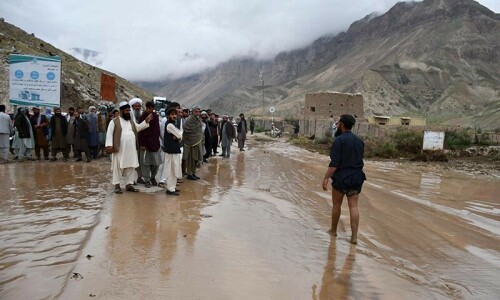TUNIS: Tunisians trickled into polling stations on Sunday in the first elections for a new second chamber of parliament under a constitution pushed through last year by President Kais Saied.
Opponents of Saied argue the election is the latest step in the president’s “authoritarian” agenda.
Saied, a former law professor who was elected president in 2019, seized executive powers two years later, sacking the government, dissolving parliament and declaring he would rule by decree.
On Sunday, the nine million strong electorate has been asked to choose more than 2,000 councillors from around 7,000 candidates, according to the Independent High Authority for Elections.
Opponents of Saied had called for a boycott of the election, which they said was “illegal” and had been “imposed”.
A feeble turnout had been widely expected. Polling stations opened at 8:00 am (0700 GMT), and an AFP journalist in the capital Tunis said they remained almost empty by midday.
“I have never seen such a low turnout during elections held in Tunisia since 2011,” said an official in charge of one polling station in downtown Tunis, who asked not to be named.
The official was referring to the year in which a revolution overthrew president Zine El Abidine Ben Ali after 24 years in power.
The protests that deposed Ben Ali helped to spark demonstrations and uprisings across the Middle East, a phenomenon later dubbed the Arab Spring.
“I understand the people who are ignoring these elections,” Salah Habib, a 60-year-old who said he cast his ballot simply “to mark (his) presence”, told AFP.
Nadia Majer, a 23-year-old student who opted not to vote, said upon leaving a nearby gym: “I didn’t understand anything about this election, and I don’t want to understand anything”.
More than 260 prominent Tunisian figures had signed a petition against what they called a “useless” election, saying Saied’s government “continues to implement its political project imposed on” people in the country.
They alleged the aim of the election was to “weaken local power, disperse it, and make it another docile instrument in the hands of the executive power”.
Since February, authorities have jailed more than 20 members of the opposition, including the Ennahdha party leader Rached Ghannouchi and Jawhar Ben Mbarek, the co-founder of the National Salvation Front, among others.
The vote will result in the establishment of local, regional and district councils, allowing for the creation of the second chamber of parliament.
President Saied’s new constitution, which was approved at a referendum in July 2022, established two chambers of parliament -- the Assembly of People’s Representatives and a National Council of Regions and Districts.
Published in Dawn, December 25th, 2023













































Dear visitor, the comments section is undergoing an overhaul and will return soon.